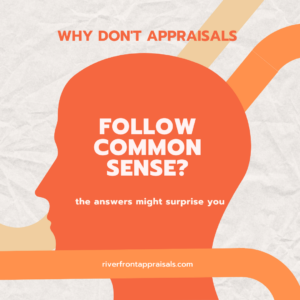
Property Taxes Just Went Up? We’ve Got You Covered!
It’s reassessment season for most folks in our area. Homeowners

In this blog post, which is part 7 of our 12-part series on Promoting Public Trust, we’ll look at a few areas within USPAP that deal with an appraiser’s conduct. If you’ve recently received an appraisal and read the entire thing, you probably have a few questions! This post will clear up a few of those questions, and help you understand some of the things appraisers are required to do (or must not do!).
Specifically, we’ll show you 11 ‘must-nots’ that are part of our Conduct Rule; we’ll also look at disclosing prior services and prospective interest; when the value opinion equals contract price, and more.
Let’s jump right in with the USPAP definition of Conduct.
Our Conduct rule says that “An appraiser must perform assignments with impartiality, objectivity, and independence, and without accommodation of personal interests.”
The definition goes on to list several must-nots. And for your reading enjoyment, I’ve listed them all here for you!
An appraiser:
That’s quite a list. For the remainder of the blog post, we’ll look at some specific examples that have to do with a few of those above ‘must-nots’, taken directly from USPAP. These will help illustrate some of the conduct rules we have to follow.
USPAP sets up an example like this:
I received an appraisal request that says: “If you can’t appraise the property for $XXX,000, you must not agree to perform the appraisal assignment.” How should I respond to this appraisal request?
First of all, if you’re an appraiser, then my advice to you would be…RUN! And, if you’re the one requesting this of the appraiser, my advice to you would be no different! The appraiser needs to run away from a certain USPAP violation, while the one requesting this needs to run away and find a new job.
USPAP says that This request would be seen as an attempt to violate the appraiser’s independence, and the request itself may be illegal. Agreeing to perform such an assignment would violate the Management section of the ETHICS RULE, which states, in part:
An appraiser must not agree to perform an assignment, or have a compensation arrangement for an assignment, that is contingent on any of the following (there are more; I’ve just listed a few here):
So to reiterate, appraisers cannot be asked to ‘hit a number’ or told they can’t accept an assignment based on a value conclusion.
[bctt tweet=”appraisers cannot be asked to ‘hit a number’ or told they can’t accept an assignment based on a value conclusion. ” username=”RiverfrontApp”]
If you’ve ever read an appraisal report, you’ll likely have noticed language that says “I have not performed any services within the three years immediately preceding the agreement to perform this assignment”… or “I performed xx service on xx date regarding the subject property…” Why is that in the report?
Per our Ethics Rule, USPAP requires us to disclose all prior services that we performed within the three years immediately preceding the agreement to perform the assignment. And, as we discussed in a previous blog post, this is generally not considered disclosing confidential information, unless the client has requested you to not disclose that you completed the assignment.
Have you ever known an appraiser who is also an auctioneer? What about an appraiser who also works as a Realtor? Ever think there might be a reason to disclose this? Let’s take this as an example: suppose an appraiser will be listing the subject property after completing the appraisal. Does this need to be disclosed in the appraisal report? You bet! USPAP says about this kind of thing that this is an example of a “current or prospective interest in the subject property.” USPAP requires that such an interest be disclosed in the certification and prior to agreement to perform an assignment or upon discovery during the assignment.
This doesn’t mean that an appraiser cannot appraise a home he or she is about to list for sale. It just means that – among other things – they must disclose the prospective interest. Namely, that they will be listing the property, and that if the home closes, they will be due a commission.
If I had a dollar for every time I heard the following:
“When I bought my home, the sale price was $200,000, and guess what?! The appraisal came in at exactly the sale price!” This is usually followed with some hint of confusion on behalf of the homeowner, wondering if they really got a true opinion of value, or if the appraiser just ‘hit the number’. There’s a question within USPAP that essentially asks “if appraisers are consistently concluding that the market value of any property they appraise is equal to the contract sale price, is this a violation of USPAP?”
Here’s what USPAP says about it. I thought about taking some of these comments out, but they’re just too good to omit. So here ya have it!
A contract sale price can be a good indicator of a property’s market value, and it may be logical and reasonable for the appraiser to conclude that they are the same. However, this is not always the case. In some situations, a contract price will exceed what is typical in a market. In other situations, a contract price will be less than what is typical. A contract sale price, while a significant piece of market data, must not become a target in an appraisal assignment.
If an appraiser consistently concludes that the contract sale price of every appraised property equals market value, particularly when a competent analysis of credible market data indicates otherwise, the appraiser’s impartiality, objectivity and independence appear to have been compromised.
So! Just because a home appraises for contract price doesn’t mean the appraisal is bad. But if it can be proven that the appraiser is always doing this, it could indicate that the appraiser has introduced bias, and that’s definitely not a good thing for anyone.
These are just a few of the aspects of Conduct that an appraiser must be aware of. And, as consumers of appraisal services, it helps if you also, are aware of what’s expected of us! Appraisers are held to very high standards, especially when it comes to how we develop our opinions of value. And, it all goes back to public trust. We are held to such high standards so that we will consistently produce independent, objective, and unbiased appraisal reports that you can trust.
If you have any specific questions about appraiser conduct, please feel free to contact us at info@riverfrontappraisals.com
Helping homeowners navigate the appraisal process,
Ryan Bays, SRA, AI-RRS

It’s reassessment season for most folks in our area. Homeowners

I feel like we all need a laugh. How about

So this may be a slight break from the norm,
Riverfront Appraisals has been providing comprehensive valuations of residential properties to Western Kentucky and Southwestern Indiana since 2008.